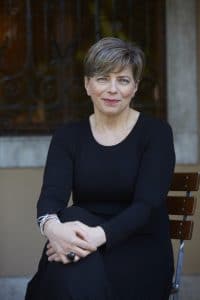‘Hem, verdomme. Moet ik nog duidelijker zijn?’ Met die woorden van de onbehouwen fotograaf Alessandro Pavia, die weesjongen Antonio aanwijst als zijn nieuwe assistent, begint voor de hoofdpersoon van de roman Antonio’s oog van Raffaella Romagnolo, een nieuw leven. Antonio Casagrande, al bijna 12 en aan één oog blind, had de hoop al bijna opgegeven dat hij weeshuis Pammatone ooit nog zou verlaten – wat ziet iemand nou in hem? Maar Pavia neemt hem onder zijn hoede en wordt haast als een vader voor hem.
Tegen de achtergrond van een politiek en maatschappelijk veranderend Italië ontvouwt zich het levensverhaal van Antonio. Pavia is aanhanger van generaal Garibaldi, die Italië tot een eenheid heeft gesmeed en vanaf 1860 met zijn ruim duizend roodhemden, i Mille, strijdt voor de vrijheid van Italië. De fotograaf portretteert Giuseppe Garibaldi zelf en de Mille, terwijl hij onderwijl Antonio de kneepjes van het vak bijbrengt. Hoewel de jongen dus aan één oog blind is, blijkt hij talent voor het behandelen van de glasplaat met collodium en zilvernitraat.
Visioenen van de dood
Zijn blinde oog ziet echter heel andere dingen dan zijn goede oog. Op momenten dat zijn oog niet is afgedekt door een ooglap, wordt Antonio soms overvallen door vreselijke beelden van rampspoed. Het duurt even voordat hij weet te ontcijferen wat het betekent: Antonio ziet de aankondiging van een nabije dood van degene die hij fotografeert. Hij doet zijn ooglap nog zelden af.
Het is mei 1898, Antonio is inmiddels 43, als zijn leven een beslissende wending neemt. In Milaan breken rellen uit onder het arme, hongerige volk, die bloedig worden neergeslagen. Terwijl Antonio foto’s schiet van de gebeurtenissen op straat, overvalt hem een visioen van het lot van een verloskundige die hij ziet lopen in de menigte. Ze zal sterven door geweld. Hij besluit in te grijpen en probeert haar en haar collega een andere route te laten lopen zodat ze niet langs de plek zullen komen die hij in zijn visioen herkend meent te hebben als de plek des onheils. Maar hij maakt een fatale vergissing en de vrouw sterft juist door zijn ingrijpen op de manier die hij had voorzien.

Toch brengt deze noodlottige gebeurtenis ook iets goeds voort: Antonio ontmoet Caterina, de collega van de omgekomen verpleegster, en zij wordt zijn vrouw. Hoewel Caterina ooit een kind heeft verloren en daardoor niet meer zwanger kan worden, schenkt het lot hen alsnog een zoon: het kind van een jong, ongehuwd meisje dat de bevalling niet overleeft. De scène van Alessandro’s geboorte is huiveringwekkend en schitterend tegelijk.
Ingrijpen of niet?
Maar zo gerustgesteld als Antonio was door het feit dat zijn blinde oog blind blijft als hij zijn vrouw fotografeert – Antonio kan het niet laten de proef op de som te nemen, maar weet nu dat hij haar niet zal zien sterven –, zo ongerust is hij door wat hij ziet bij zijn zoon. Als de dag zich aandient waarop die beelden werkelijkheid worden, is de vraag dan ook: kan hij het lot van zijn zoon veranderen? Moet hij wel ingrijpen, of juist niet?
Romagnolo slaagt erin een vervlogen tijd als het ware in sepia tot leven te wekken met beeldende beschrijvingen, enkele heerlijke en innemende personages en zinnen waar je oog net wat langer aan blijft haken. De vaak wrede gebeurtenissen in de buitenwereld en de nare beelden die Antonio kwellen, vormen een mooi contrast met de gevoelige personages. Hoewel ze allemaal klappen van het leven hebben gekregen, bezitten ze onder de ruwe bolster een bepaalde tederheid. Hoewel de spanning die de ‘gave’ van Antonio’s oog aanvankelijk oproept, gaandeweg verflauwt, maakt het slot van de roman dat zeker goed.
Antonio’s oog is een roman die niet snel van je netvlies verdwijnt.
Signatuur, € 22,99, 320 p.
